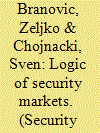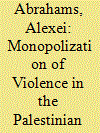| Srl | Item |
| 1 |
ID:
110778


|
|
|
|
|
| Publication |
2011.
|
| Summary/Abstract |
This article presents a theoretical framework with which to discuss how non-state modes of security governance evolve in the context of state failure and/or collapse. To address this issue, we present the logic of security markets, which assumes that the evolution of security governance by non-state groups in failed states is a function of both resource availability and the strategies that armed groups apply to extract resources from the civilian population. Axiomatically, we expect that in the short term the central purpose for the use of force is survival and achieving the ability to finance one's capabilities to use force, although ultimately this also includes the seizure and control of territory. The main argument is that the changing competitive conditions in security markets - which we measure in terms of the total number of violent groups and their organizational design, size and strength - explain the rationales behind the decisions of armed groups either to use violence against the civilian population or to invest in the provision of security.
|
|
|
|
|
|
|
|
|
|
|
|
|
|
|
|
| 2 |
ID:
175501


|
|
|
|
|
| Summary/Abstract |
Palestinians currently find themselves involved in two conflicts: an external one with the state of Israel, and an internal one with the leadership of the Palestinian national movement itself. In this essay, we argue that violence is overly monopolized in both conflicts. Firstly, Israel can safely ignore the peace process and renege on political concessions as long as Palestinians lack a credible militant threat. This threat, in turn, has been neutralized in large part by the Palestinian Authority (PA) itself, which has offered Israel increasingly effective security cooperation over the past decade. We argue that the PA’s decision to deepen security cooperation with Israel – in spite of its unpopularity among Palestinians – results from its own territorial monopolies on violence, which render it unaccountable to its constituents. Only by reintroducing a credible, latent threat of political-militant competitors to the PA will Palestinians be able to regain bargaining leverage over their own leadership, restore conditionality to their security cooperation with Israel, and put the peace process back on course.
|
|
|
|
|
|
|
|
|
|
|
|
|
|
|
|